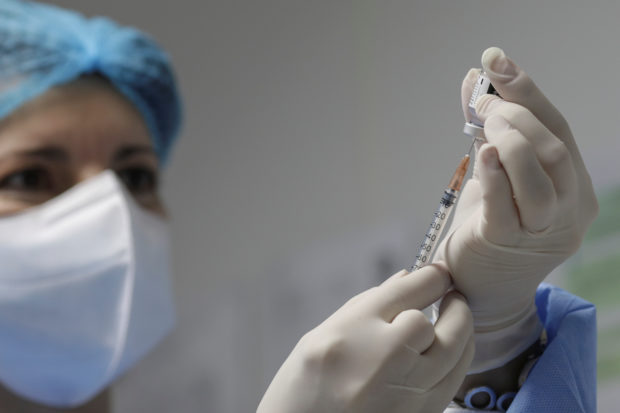European nations say Covid vaccines fall short as Pfizer slows supplies

FILE PHOTO: A nurse prepares a dose of the Pfizer-BioNTech coronavirus disease (COVID-19) vaccine at Matei Bals Infectious Diseases Institute in Bucharest, Romania, December 27, 2020. Inquam Photos/Octav Ganea via REUTERS
BRUSSELS — Many European nations say they are receiving lower-than-expected supplies of Covid-19 vaccines as U.S. pharmaceutical giant Pfizer slows shipments and distribution proceeds unevenly among European Union states.
Vaccines developed by Pfizer with its German partner BioNTech started being delivered in the EU at the end of December. U.S. biotech firm Moderna began delivering its shot this week after the bloc approved it on January 6.
Yet about one-third of the 27 EU governments cited “insufficient” doses of vaccines at a video conference of health ministers on Wednesday, a person who attended the virtual meeting told Reuters.
They also complained about uncertain timetables for future deliveries, the official added, without naming any country.
Pfizer initially said deliveries were proceeding “according to the schedule agreed.” But later on Friday, it said there would be a temporary impact on shipments in late January to early February caused by changes to manufacturing processes to boost production.
Article continues after this advertisementThis comment came after Norway and Lithuania said the company was reducing supplies in Europe.
Article continues after this advertisementEarlier this month, Belgium said it expected to receive only around half of the planned doses of the Pfizer vaccine in January due to a logistical issue. Lithuania said it was told this week its supplies would be halved until mid-February.
“The manufacturer told us the cuts are EU-wide,”, Lithuanian health ministry spokesman Vytautas Beniusis told Reuters on Friday.
Lower-than-expected amounts were delivered to Italy at the beginning of January, but the issue seemed now largely resolved, an Italian official said.
A second EU source told Reuters that in another EU internal meeting with diplomats on Wednesday, an EU Commission official said deliveries would be limited at least until March, with production set to be ramped up in earnest only by September.
The Commission’s top vaccine negotiator Sandra Gallina had told EU lawmakers in a public meeting on Tuesday she had heard only three instances of “relatively minor” complaints about deliveries from EU governments.
A Commission spokesman declined to comment on concerns about limited supplies and uncertain timetables.
Pro-rata?
Pfizer and BioNTech have two contracts with the EU for the supply of up to 600 million doses this year. They have agreed to deliver 75 million doses in the second quarter and more later in the year. It is unclear how many doses can be distributed in the first three months.
Moderna has committed to delivering 10 million doses by the end of March and 35 million each in the second and third quarters. Another 80 million doses are also to be delivered this year but without a clear timetable yet.
The vaccine makers have not published detailed calendars of deliveries for each of the 27 EU countries, which are expected to receive a portion of vaccines in proportion to their share of the EU’s 450 million population. Pfizer said the information was confidential.
“At this stage, we can only confirm that the doses will be distributed on a pro-rata basis between EU countries,” a spokesman for Moderna said.
But deliveries do not seem to be proceeding evenly.
The German Health Ministry says on its website that the country, with a population of 83 million, will receive nearly 4 million Pfizer doses by the end of January.
Romania, with a population four times smaller, says it expects to receive only 600,000 doses in the same period. Bulgaria, with less than one-tenth of Germany’s population, expects to receive only about 60,000 Pfizer shots in January, in proportion much less than Germany.
A spokesman for the EU Commission said national timetables partly depended on contracts signed by each state. It is not clear whether all EU governments ordered their full allocation of vaccines, as this information is confidential.
Non-EU Norway is getting access to the vaccines obtained by the European bloc thanks to Sweden, an EU member that will buy more than it needs and sell them to Norway.
The EU has secured nearly 2.3 billion doses of COVID-19 vaccines and candidates from six firms, but most yet to be approved. Decisions on AstraZeneca and Johnson & Johnson vaccines are expected respectively in late January and in February.
For more news about the novel coronavirus click here.
What you need to know about Coronavirus.
For more information on COVID-19, call the DOH Hotline: (02) 86517800 local 1149/1150.
The Inquirer Foundation supports our healthcare frontliners and is still accepting cash donations to be deposited at Banco de Oro (BDO) current account #007960018860 or donate through PayMaya using this link.